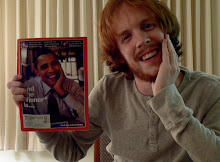Sometime during the middle act of Cloverfield, the main character runs into a currently-being-looted electronics store to get ahold of a new phone. As New York City burns to the ground around them, several people stare in stunned silence at the televisions in the store displaying footage of the thirty-story tall monster. Less than two minutes later, the camera leaves the store and reveals to the audience that the very newsreport that many had stood silent to watch is occuring literally down the block.
This scene is the moment I will always point to when I talk about Cloverfield. Whether literal or not, this scene works as the thesis of Cloverfield, a monster movie for 2008: less concerned with its own monster, instead focusing on how people's natural survival instincts have become secondary to the comfort that the documentation and digestion our world through images and sound provides us.
When Marshal McLuhan declared that "the medium is the message", he was stressing the oft-overlooked effect that communications media can have on our subconcious. According to McLuhan, the direct message being delivered can sometimes have a less meaningful effect than the media through which it is being delivered. In this theory, our rational and intelligent mind engages with the overt signals sent to us, but the subliminal influence on our subconciouses poses a more dire, less protected-against threat.
Surely, J.J. Abrams is familiar with McLuhan's work, which leads me to give him the benefit of the doubt in regards to the flimsy story all this media-pontificating decorates.
Of course, this is surely not the only thought driving Cloverfield, but that is what is so nice about the film, it is a monster movie that aquits itself well to multiple readings. On the surface, Cloverfield is a popcorn epic with a small twist: the entire movie is shot on handheld camera, being operated by one of the main characters. 1st person narrative films are usually considered somewhat gimmicky (and they usually are), but this small change in detail transforms the concept of Cloverfield from action film into a fascinating cultural study. The film is not so much worried about explaining the monster attacking New York City or blowing up cars as much as it is enraptured with the bizarre reactions human beings have to large-scale panic.
Unfortunately, this strength ultimately contributes to Cloverfield's weakest element: the story. While I applaud J.J.'s tactful, classy take on a "everyone dies" monster movie, the film could have used more actually affecting human emotion in its narrative. The rush we feel upon the monster's epic entrance earns enough goodwill for 45 minutes or so, but the rest of the film drags in comparison. I blame this on the lack of attention to the actual plot of the film. While the search-and-rescue story provides plenty of chances to see various portions of a destroyed New York, the sheer stupidity of it makes for a frustrating film. I assume that the characters are purposefully borderline-dislikable (they represent what one critic called the 9/11 yuppies, or the arrogance of NYCers who weren't present for the tragedy), but far too much time is spent unsuccessfully reaching for audience sympathy for one-dimensional characters. Abrams may have fared better if he had taken his character's symbolic nature all the way and excluded any unnecessary exposition from the movie. This all said, however, I managed to enjoy the film's brainy center despite the bland cookie shell.
The video camera as viewer trick aside, modern media consumption is a major thematic focus in Cloverfield. When the Statue of Liberty's head comes rolling right down the street, the dazed citizens stare in shock and confusion...and then quickly whip out their phones the get a picture of it. This need to document distaster (also seen in the fact that for some reason, our protagonist refuses to drop the stupid camcorder) has become a prevelant trend in America since someone got footage on their shitty little camera of someone flying a plane into the World Trade Center. This is what makes Cloverfield special: it's not about the monster, it's about the people REACTING to the monster, numbing themselves by putting up some sort of lens to seperate themselves from the terror around them.
While I have a moment, I might as well declare this to be one of my favorite films dealing with September 11th, with the caveat that I have avoided almost all movies more directly focused on the events.
Nathaniel Tyson
PS:
Thanks to my lovely Politics of Pop Culture professor, Susana Loza, I have become aware of one of the best websites to have ever been conceived: Stuff White People Like. The picture of sushi on the page's banner won me over instantly.
While I do admit that I feel somewhat in-on-the-joke, this entry is a definite reminder of just how disappointingly stereotypical I can be.
PPS: I don't grade films, by the way, but if you're the kind who reads reviews as thumbs-up/thumbs-down, I recommend it with some hesitation.

